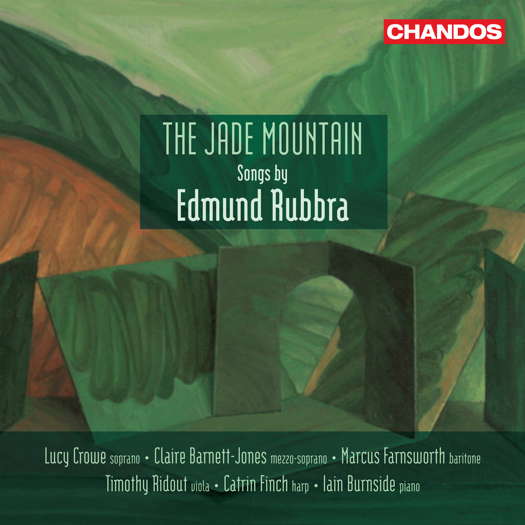- Mendelssohn
- Granville Bantock
- Paris Conservatory
- Clara Butt
- Dika Rancigaj
- Wolfgang A Mozart
- English musical Renaissance
- Hedwig Lachmann
 SPONSORED: CD Spotlight. Well Realized - Varda Kotler and Israel Kastoriano - recommended by Geoff Pearce.
SPONSORED: CD Spotlight. Well Realized - Varda Kotler and Israel Kastoriano - recommended by Geoff Pearce.
All sponsored features >>
 DISCUSSION: What is a work? John Dante Prevedini leads a discussion about The performing artist as co-creator, including contributions from Halida Dinova, Yekaterina Lebedeva, Béla Hartmann, David Arditti and Stephen Francis Vasta.
DISCUSSION: What is a work? John Dante Prevedini leads a discussion about The performing artist as co-creator, including contributions from Halida Dinova, Yekaterina Lebedeva, Béla Hartmann, David Arditti and Stephen Francis Vasta.

Very Satisfying
GEOFF PEARCE is impressed with songs by Rubbra
'... a very enjoyable and thought-provoking disk ...'
Edmund Rubbra (1901-1986) is a bit of an enigma. He was quite popular when he was alive, particularly with his early works, and was much admired by many of his peers. Unfortunately, since his death, performances of his works are very much fewer now, and many people have never heard of him, especially outside the UK. He wrote a considerable amount of music, and is probably best known today for his eleven symphonies and other symphonic works. I was first introduced to his music hearing something on my valve radio. I think it may have been one of his symphonies, but I sought out his oboe sonata and quite often play it as I enjoy it very much. I had not heard his songs until this album, so was quite keen to listen and review it.
The early songs, written when Rubbra was in his twenties, are very fine, and somewhat in the vein of Vaughan Williams, Cyril Scott and Gerald Finzi. One often forgets how beautiful some of the English songs of this period are. Some are obviously inspired by folk music, and others less so. There is a lovely transparency to these songs. Many of these songs have also been set by other composers, especially by his friend Gerald Finzi. The melodies are strong, and the piano writing is clear and does not intrude.
Listen — Rubbra: Nod
(CHAN 20182 track 3, 0:00-0:38) ℗ 2023 Chandos Records :
Chronologically, the disc does not follow the earliest to latest, order. Rubbra's later songs are quite different from his earlier ones. He was fascinated by the cultures and philosophies of Asia but he does not appear to have used the musical language of any of these influences. The setting of five poems from the T'ang dysnasty entitled The Jade Mountain from 1962 are such pieces, and employ a harp to accompany the solo voice. These settings are very beautiful and are a good example of Rubbra's later style The use of the repeated harp notes in the final song, against a rather chant like melody, perhaps signifies a Buddhist meditation.
Listen — Rubbra: Farewell to a Japanese Buddhist Priest bound Homeward
(The Jade Mountain)
(CHAN 20182 track 26, 0:00-0:43) ℗ 2023 Chandos Records :
Another strong influence, particularly in the latter part of his life when he converted, was the Catholic Church. In this collection, the Opus 87 Two Sonnets of William Alabaster best exemplify this. They are scored for mezzo, viola and piano. These were written in 1955 and in many ways, are Rubbra's most ambitious songs, certainly the most passionate, and somewhat conflicted. There is something about them, however, that I find very satisfying.
Listen — Rubbra: Upon the Crucifix (Two Sonnets by William Alabaster)
(CHAN 20182 track 17, 1:28-2:20) ℗ 2023 Chandos Records :
Rubbra's last song, Fly Envious Time, Op 148, was written in 1974 in memory of his good friend Gerald Finzi, who died young in 1956. This was Rubbra's only Milton setting, but Finzi had earlier written a collection of Milton sonnet settings that he dedicated to Rubbra.
Listen — Rubbra: Fly Envious Time
(CHAN 20182 track 30, 1:42-2:21) ℗ 2023 Chandos Records :
If you enjoy English song as much as I do, and also like the music of Rubbra, this is a very fine disc. You could not get better musicians to perform them. For me, Iain Burnside is the star performer as I enjoyed his playing very much. This is not to say that I enjoyed the singers and the other two instrumentalists any the less, but as Rubbra himself was a fine pianist - I have a recording of the Oboe Sonata with Evelyn Barbirolli and Rubbra himself at the piano - I found Burnside a very worthy accompanist. This is a very enjoyable and thought-provoking disk and I am really pleased to have come across this fine, rarely performed music.
Copyright © 20 April 2023
Geoff Pearce,
Sydney, Australia



